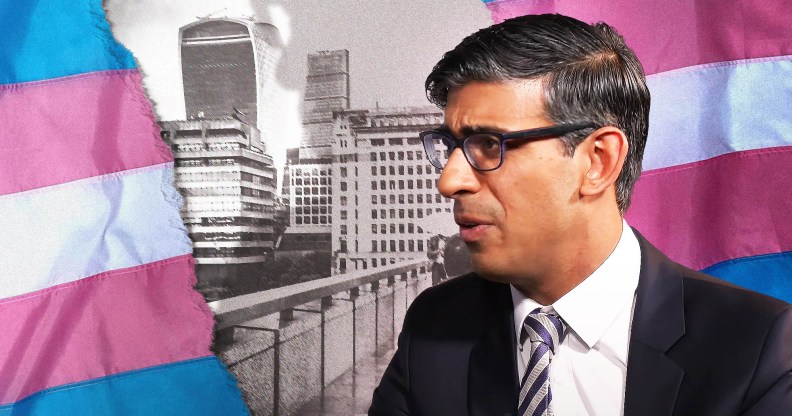Rishi Sunak is talking about penises again while food poverty and cost of living soars

During Prime Minister’s Question (PMQs) on Wednesday, 24 May, the prime minister was asked by Independent Leicestershire North west MP Andrew Brigden about pronouns. (PinkNews)
Unelected Tory prime minister Rishi Sunak has said “biological sex is fundamentally important”, as his government appears to be moving towards banning trans people from same-sex spaces altogether.
Speaking with ConservativeHome, the PM made his stance on trans rights clear while seeking to distinguish himself from Labour leader Keir Starmer by stating that “100 per cent” of women do not have a penis.
At the beginning of April, Starmer was accused of “throwing trans people under the bus” during an interview with The Sunday Times, where he said: “For 99.9 per cent of women, it is completely biological … and of course they haven’t got a penis.”
In the interview, Sunak said we should “always have compassion and understanding and tolerance” for people exploring their gender identity but vowed to protect same-sex spaces on the basis of biology.
“As a general kind of operating principle, for me biological sex is vitally fundamentally important,” he said, “We can’t forget that and that’s why we need to make sure – particularly when it comes to women’s health, women’s sports or indeed spaces – that we’re protecting those rights and places.”
Rishi Sunak’s words come just a week after the Equality Human Rights Commission (EHRC), the UK’s human rights watchdog, issued advice to the government on redefining the category of ‘sex’ under the Equality Act.
In February, women and equalities minister Kemi Badenoch wrote to the EHRC seeking advice “clarifying” sex for the “effective operation of the Equality Act 2010”.
This followed reports in November 2022 that Rishi Sunak wanted to “gut” trans rights from the Equality Act and review it to “make it clear that sex means biological sex rather than gender”.
The watchdog released its advice in a public response on 4 April, stating while “no straightforward balance”, defining sex as “biological sex” would “bring great legal clarity”.
This advice was controversially welcomed by Labour, which said “clarification is a good thing” and the party will “look closely at what’s brought forward”.
The EHRC noted there were several areas where a definition of sex as biological would create more “clarity” but also many others where a change in definition would be “ambiguous or disadvantageous”.
The letter from the EHRC is currently just advice and does not change the Equality Act or how it operates.
However, the government may choose to implement these amendments and thus change the definition of sex in the legislation.
‘Trans people no longer seem to be people in their eyes’
There is grave concern amongst trans activists that such a change will have negative consequences on their day-to-day lives, as well as the lives of cis people.
Helen Belcher, chair of TransActual, said at the time the EHRC’s advice may lead them to seek to redefine what a ‘woman’ is altogether.
Belcher said: “Our challenge to the increasingly misnamed EHRC and [Kemi Badeoch] is: why it is necessary now to try to redefine ‘woman’ to exclude trans women (and include trans men) when there is no evidence of problems actually caused by the understanding that has existed for decades?
“By insinuating in its previous advice that organisations should exclude trans people from single-sex services and spaces, and now proposing that parliament actively considers effectively removing trans people from sex-based protections under the Equality Act, the EHRC continues demonstrating its inability to fight for human rights for everybody.”
She added: “Trans people no longer seem to be people in their eyes. Our pains and struggles are seemingly irrelevant.”
How did this story make you feel?

